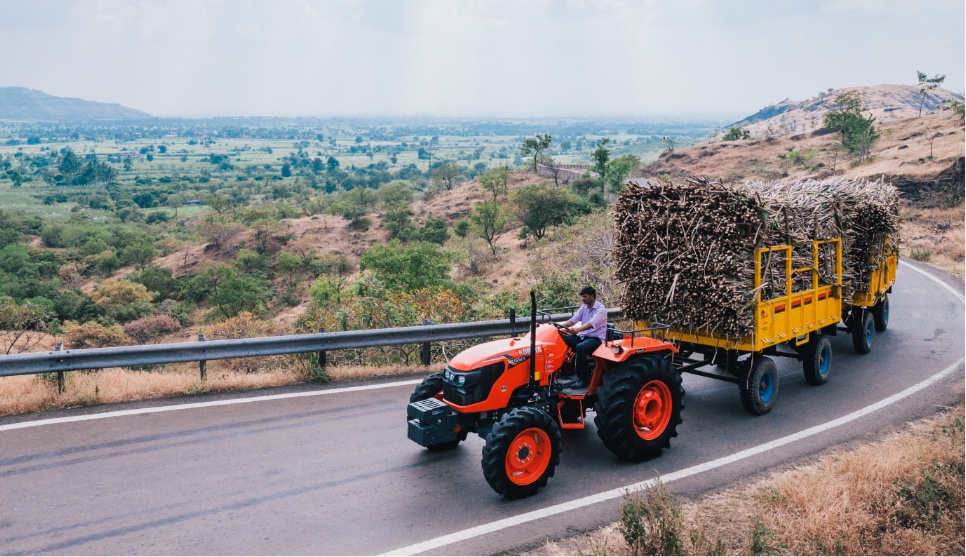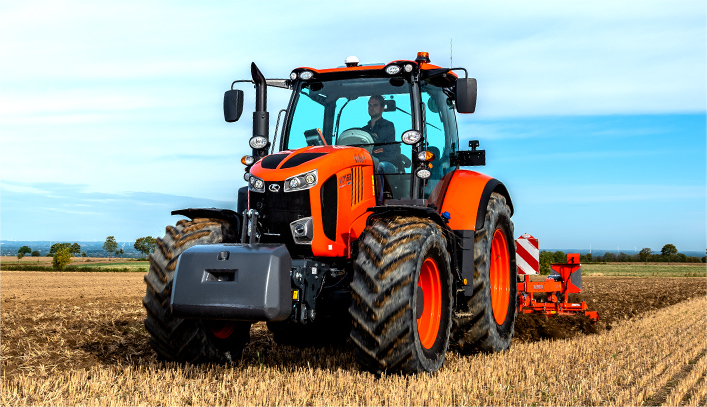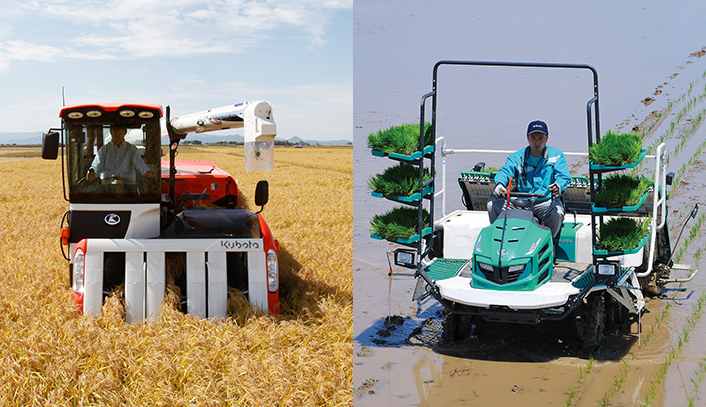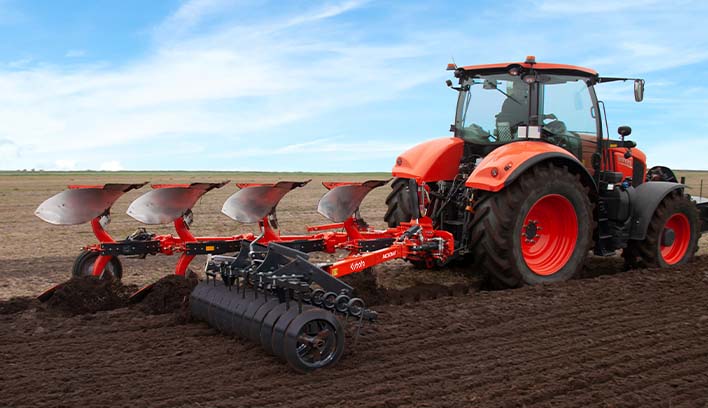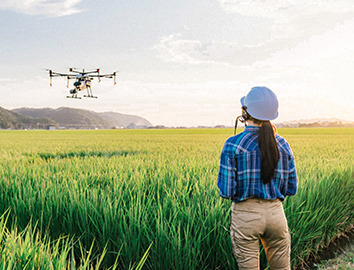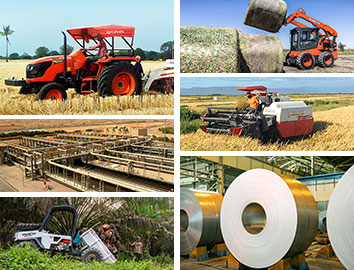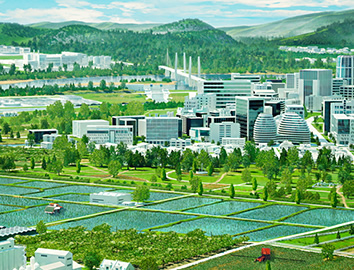Agriculture
Supporting the world’s food supply and securing a prosperous future for people and food
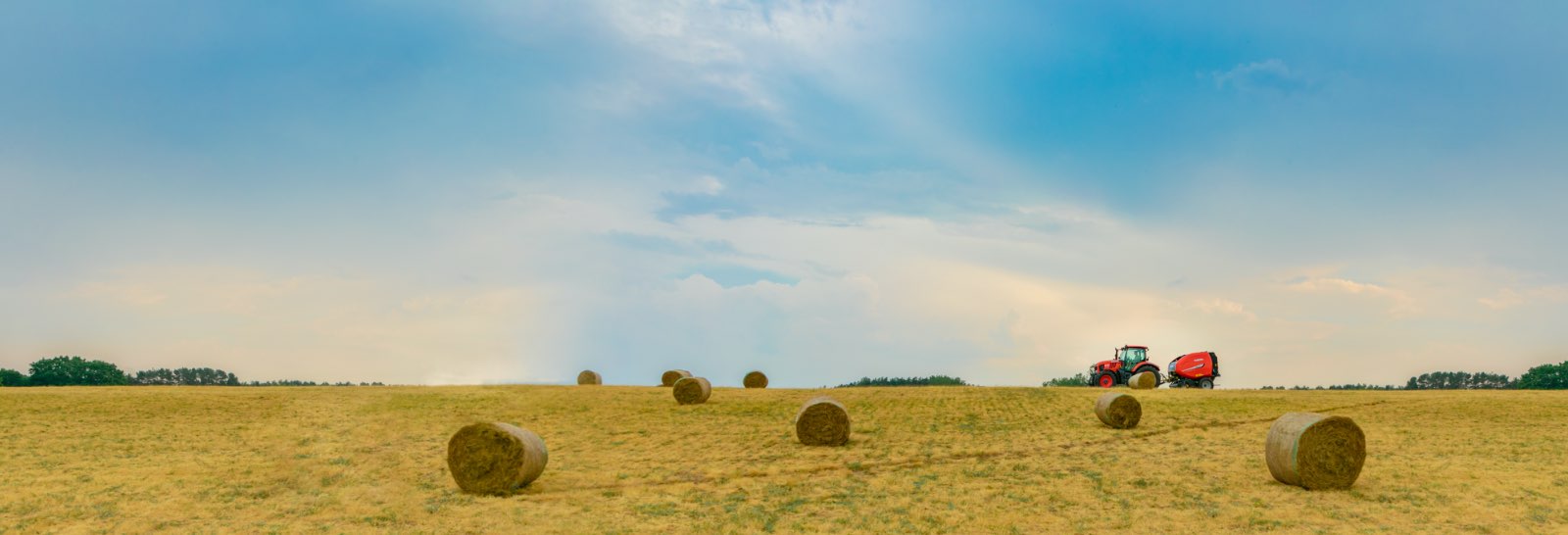
Kubota is one of the few agricultural machinery manufacturers in the world involved in both rice farming and dry-field farming. We support agriculture throughout the world by working closely with farmers and developing agricultural machinery that meets their needs in the field. In recent years, our focus has been smart agriculture, a new approach to farming that combines Kubota’s exclusive data utilization methods and automation. We will continue to address food shortages, which are becoming a serious problem due to population growth around the world, by improving agricultural productivity to ensure a prosperous future for people and food.
A Total Solutions Company that Shapes the Future of Farming
In addition to developing and manufacturing agricultural machinery, Kubota offers agricultural solutions that provide comprehensive support for all stages, from production to processing and consumption of agricultural products. In response to global agricultural challenges, such as food shortages and a decline in farm workers, Kubota is pursuing initiatives that focus on the future of farming, including the integration of IoT into agriculture, exports of Japanese rice, quality measurement technology that visualizes the added value of agricultural products, and developing ways to make bread and pasta using brown rice. We will continue to incorporate new technologies and reshape agriculture to meet the needs of the times as a total agricultural solutions company that goes beyond the realm of a machinery manufacturer.

Addressing the Challenges Farmers Face and Supporting Global Agriculture
The history of Kubota agricultural machinery, which began after World War II, has continued alongside farmers. Japan faced a food shortage just after the war, and then a declining number of farmers in its postwar economic boom. To address these issues, Kubota developed various kinds of agricultural machinery and led the mechanization of farming. Starting with engines for agricultural machines, we launched a series of products tailored to the needs of farmers, including tractors, combine harvesters, and rice transplanters. Kubota’s agricultural machinery business, a specialist in rice farming and agricultural machinery, shaped the history of Japan's agricultural mechanization. Meanwhile, agricultural issues exist in other countries and territories and with different crops throughout the world, and their details vary widely. Kubota will continue to support global agriculture by addressing each and every issue in a manner tailored to each region, while making the most of its technologies and expertise that have contributed to agriculture in Japan.
Developing Oil Engines and Tractors in Japan to Create an Agricultural Labor Force
In 1922, there was a growing demand for oil engines for agriculture and industry caused by the massive drought that struck western Japan. In response, Kubota launched an agriculture and industry engine in 1923, designed for Japanese products with its low noise output and size. This became the driving force for irrigation pumps and hullers. In 1960, to replace the large tractors made in Europe and the United States that were not a good fit for the scale of Japanese agriculture, we developed a rider-driven tractor designed thoroughly with the structure and functions unique to Japan’s working style and economy. Kubota has incorporated the needs of farmers into its domestic tractors, contributing significantly to the creation of the agricultural labor force.
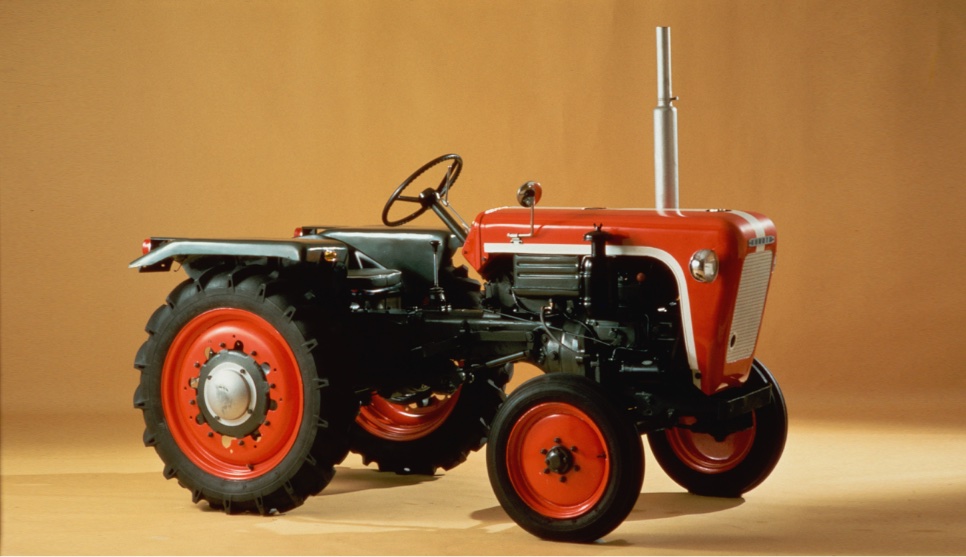
Supporting farmers with products deepening the needs of the field
Kubota Farms, demonstration farms operated in 13 locations throughout Japan, are real farms that implement and demonstrate the low-cost, labor-saving, and precision technology required for farming in the future. They are also used for conducting trials for total solutions that integrate not only crop production but also distribution and sales. For example, the Kubota Farm located in Mitoyo City, Kagawa Prefecture, has converted the sports ground of a former elementary school to strawberry fields. We are working to improve strawberry quality using houses equipped with the latest automated environmental control systems. In addition, we are working to enable independent farm management that incorporates the local community by inviting tourists of all ages, from children to the elderly, to enjoy these farms.
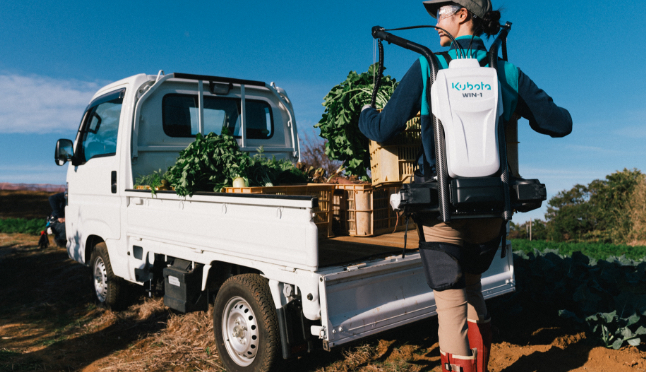
Leading the Next Generation of Farming with Smart Agriculture to Achieve Ultra Energy Efficiency and Precision
In order to resolve the increasingly serious problems faced by agriculture on a global scale, including the aging of farmers and shortages of workers, Kubota is promoting smart agriculture that realizes ultra-labor saving, high-quality, and high-efficiency cultivation by utilizing robotics technology and ICT. Kubota’s precision farming system KSAS (Kubota Smart Agri System), which collects and utilizes farm information in the cloud to support farming, and its smart agriculture, which makes use of automated farm machines to enable unmanned operations, will realize more efficient and profitable farm management. In Asia, we are helping to spread the latest agricultural machinery, while in Europe, where precision agriculture use is growing, we are developing automated farming machines that work with local precision agricultural systems. These are some of the ways we will contribute to the realization of smart agriculture around the world by providing products tailored to local needs.
High-precision automated operations with tractors, rice transplanters, and combine harvesters
Agri Robo is a series of autonomous farming machines developed by Kubota that play a role in the realization of smart agriculture. Following the tractors that we have developed in the past, these machines enable high-precision automated operations, even with agricultural machinery such as rice transplanters and combine harvesters that handle complicated tasks. They contribute greatly to the ultra-labor saving in farm work and data-driven precision agriculture.
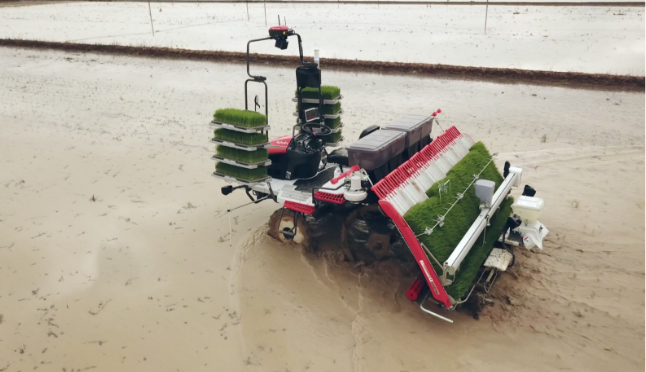
KSAS continues to evolve toward more advanced farm management
The Kubota Smart Agri System (KSAS) is a service that enables more efficient implementation of high-value-added production by storing various types of data from farm machinery and agricultural work in the cloud. Work information from agricultural machinery and ICT is stored in the cloud and linked with field maps and agricultural machinery data for more efficient cultivation management and stable production of high-quality crops. In the future, we are aiming to provide solutions through which anyone can achieve highly advanced farm management, including support for both rice and dry-field farming, growth forecasting using weather and other big data, and linking of various information systems such as accounting and sales as well as external data from financial institutions to maximize profits through AI processing.
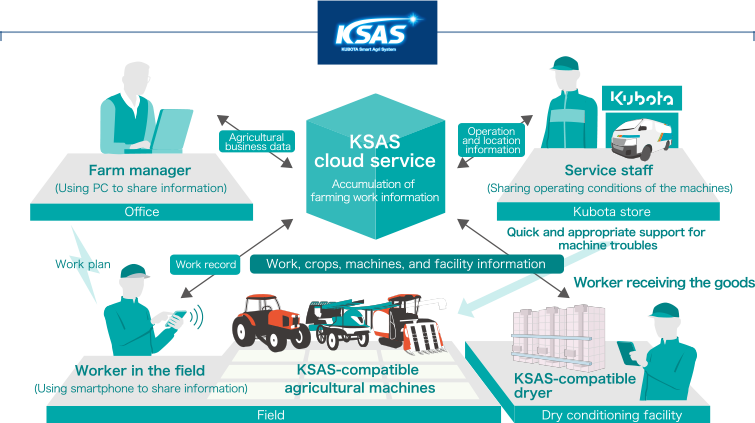
Kubota Agricultural Machinery At Work Throughout the World
Since its founding, Kubota has grown and evolved alongside Japanese agriculture. Taking advantage of its many years of experience and technologies cultivated on farms, we have grown to become a comprehensive agricultural machinery manufacturer engaged in both dry-field and rice farming, contributing to agriculture in various parts of the world. Kubota’s unique style of working in close proximity with farmers has earned the company an excellent reputation around the globe, not only for its value and quality in terms of durability and operability, but also for its ability to respond to exact needs on farms and its ability to provide services and maintenance tailored to local characteristics.
Accelerating development of large dry-field machinery to meet growing global grain demand
Kubota believes that global population increase and the growth of the middle class due to economic development will lead to rising global demand for food, especially grains that can be used both for food and feed. For regions such as North America and Europe that have large amounts of agricultural land, we are developing a large dry-field tractor with high horsepower. In response to the growing demand for high-horse power tractors in North America and other areas with many large-scale farms, we have developed the M8 series, our largest and most powerful tractors, with over 200 horsepower. We will contribute to the global food supply by improving productivity through large-scale agricultural machinery tailored to each country's needs.
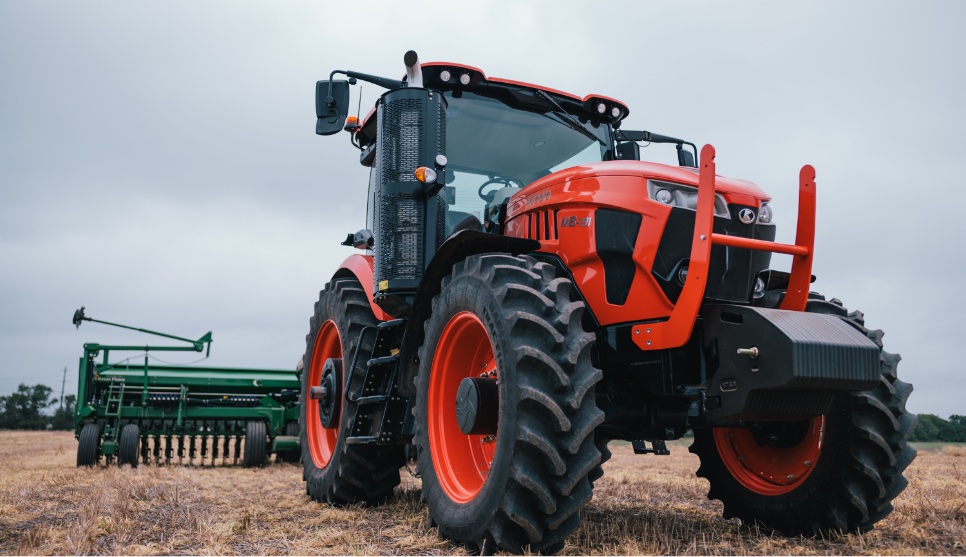
Implements that achieve farming optimization using interlocking control with tractors through data communications
Implements can be connected to tractors for various tasks including tilling, spraying of fertilizer, pesticides and seeds, mowing, and transporting harvests. Kubota, along with the Kverneland Group, a specialized manufacturer of implements that joined the Kubota Group in 2012, has been promoting the refinement of agriculture through implements that utilize information and communications technology. By installing implements compatible with ISOBUS*, an international communications standard, farmers can efficiently and productively utilize data, such as accurate spraying of different fertilizer quantities on different fields and locations. We will optimize farming through total solutions that include implements.
- ISOBUS: The standard data communication protocol for interlocking control between tractors and equipment
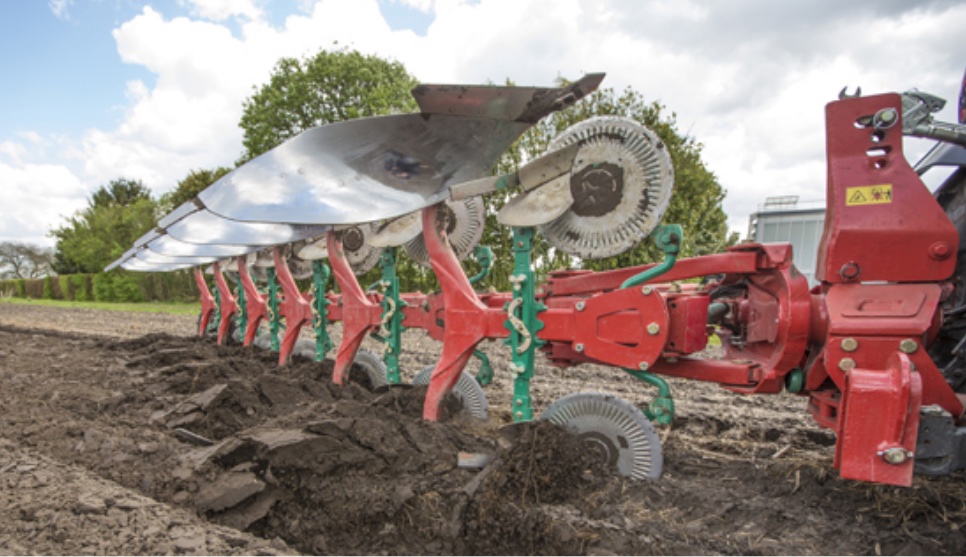
Aiming to become the global leader in agricultural machinery
To contribute to solutions for potential global food problems, Kubota has established development and production centers around the world and is developing products and solutions that meet the needs of each country. In North America, we first cultivated the market for small tractors, and from there entered the large tractor market. We also provided new value in the form of agricultural machinery that can utilize small tractors for lawn mowing, creating a market that did not exist before. In Asia, which has high levels of rice farming, the machinery refined in Japan contributes to productivity improvements. In Africa, where mechanization of agriculture is still progressing, the demand for rice is growing rapidly, and we will contribute to the gradual spread of agricultural machinery. In these ways, we will develop solutions tailored to local conditions, and aim to become the global leader in comprehensive agricultural machinery.
